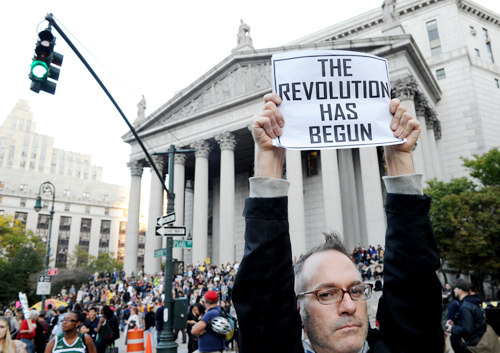|
 |
|
CALLING FOR CHANGE: Protesters rally in Manhattan, New York City, on October 5 (SHEN HONG) |
The "Occupy Wall Street" protests have grown from an insignificant lower Manhattan gathering of around 1,500 people to tens of thousands of people across the United States, from Anchorage, Alaska to Tampa, Florida. The protests started on September 17, denouncing the greed and recklessness of the financial titans who brought down the U.S. economy.
Protesters have different backgrounds in terms of professions, ages, political standpoints, ethnicity and religions. But at least they share one thing in common: They are not the rich. They call themselves the 99 percent.
"Make less than $1,137,684 a year? Congratulations! You're one of the 99%," said a poster in Zuccotti Park in New York City's financial district, where the protesters have established themselves.
They represent a variety of goals and demands, such as raising taxes on the rich and corporations, supporting trade unions, providing affordable healthcare, and dealing with global warming. But they shared common anger toward the ever-growing disparity in wealth and resource distribution, and the influence of big businesses and the wealthiest on the government.
They are angry because they believe the richest 1 percent is taking almost 40 percent of the nation's wealth while being taxed more lightly than the majority of Americans. They are angry because they believe their country is "unfair," "failed" and "broken."
As the movement continues to gain attention, some of the wealthy have tried to explain the story from the "1 percent" side.
According to The Washington Post, a self-identified founder of a tech company wrote on a social news website called Reddit, "I am a multi-millionaire and member of the 1 percent. Do I think Wall Street is to blame? Yes and no. They cater to what people want. The real problem is politicians, who should regulate banking."
But politicians themselves took different views toward the protesters. Independent Senator Bernie Sanders of Vermont appeared on Current TV's Countdown With Keith Olbermann on September 29, supporting the protests. "We desperately need a coming together of working people to stand up to Wall Street. We need to rebuild the middle-class in this country," said Sanders.
"I support the message to the establishment, whether it's Wall Street or the political establishment and the rest, that change has to happen," said House Democratic leader Nancy Pelosi in an interview with ABC News' This Week on October 9.
However, on the same day, Republican presidential candidate and Florida businessman Herman Cain said on CBS' Face the Nation that the protests are "class warfare" and "anti-American because to protest Wall Street and the bankers is basically saying that you're anti-capitalism." He said some of the protesters are there because they don't have jobs and that's the problem of the Obama administration.
"We know that the unions and certain union-related organizations have been behind these protests that have gone on, on Wall Street and other parts around the country. It's coordinated to create a distraction so people won't focus on the failed policies of this administration," Cain said.
U.S. President Barack Obama took a cautious attitude toward the protesters. At a news conference held on October 6, he said he understood the protesters' concerns about the nation's financial system. "I think people are frustrated," he said. "The protesters are giving voice to a more broad-based frustration about how our financial system works."
He also took the chance to criticize the Republicans. "What we've seen over the last year is not only did the financial sector—with the Republican Party in Congress—fight us every inch of the way, but now you've got these same folks suggesting that we should roll back all those reforms and go back to the way it was before the crisis," he said.
It seems that the two political parties have always found it much easier to blame each other for problems rather than seeking compromise for solutions. This has added to the disappointment of angry Americans who are fed up with political brinkmanship.
The "Occupy Wall Street" movement "was not inevitable, but certainly necessary," said Roxanne Dunbar-Ortiz, a professor emeritus with the Department of Ethnic Studies at California State University, East Bay.
| 